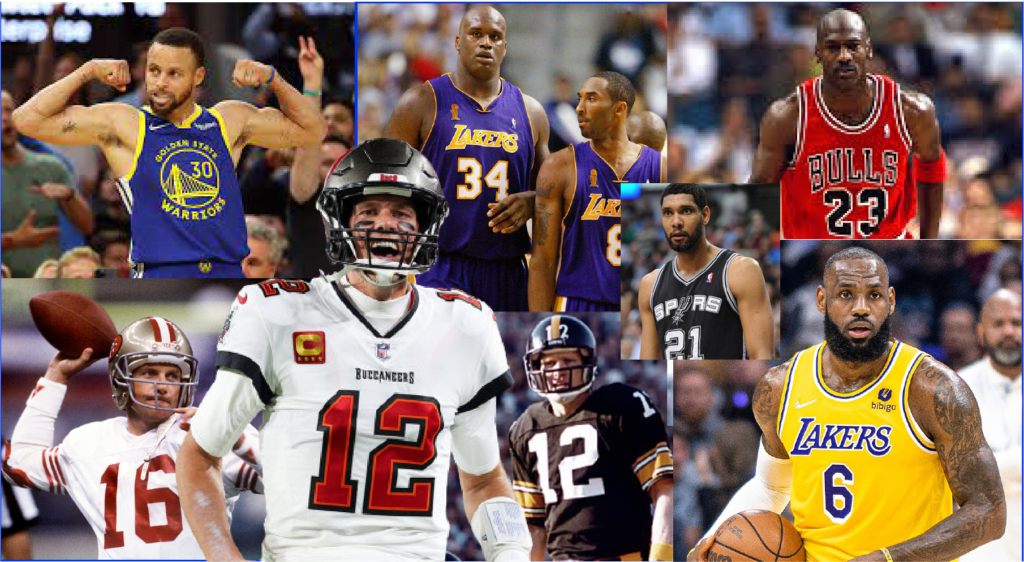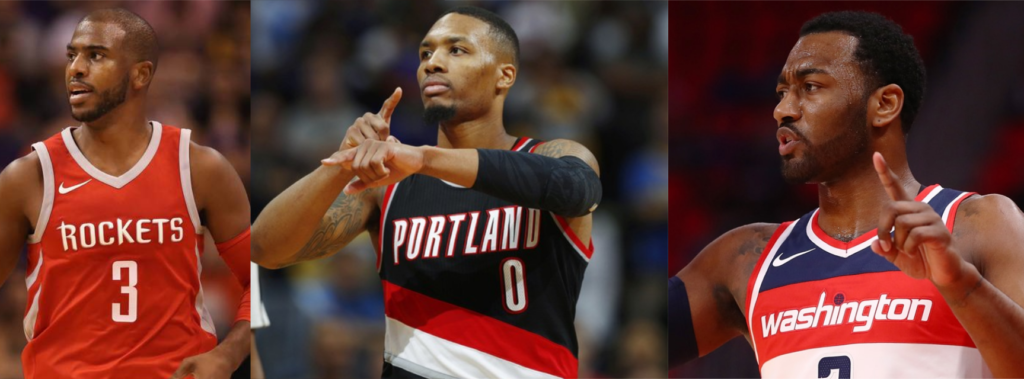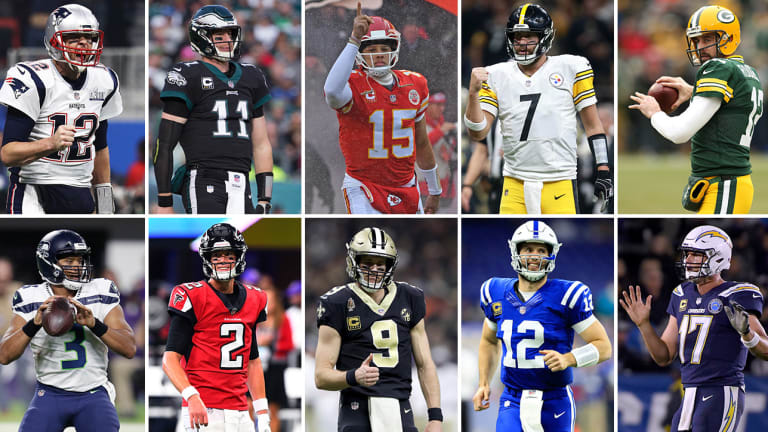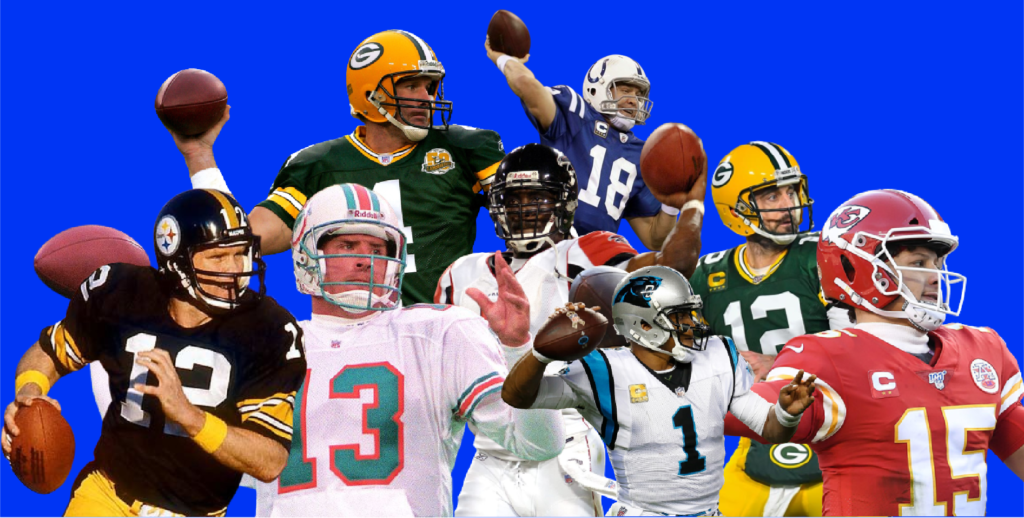Generally speaking, rings are a reflection of a player’s greatness. (This mostly applies to the NBA, where an individual player does have a large, outsized impact on his team’s ability to win games, and also for NFL QBs, who also have an outlier impact on a team’s ability to win games.)
We can call this the Rings=Greatness Theory. A player that is great, will usually win a ring. If a player failed to win rings, or won less rings than expected, then it is usually because they weren’t great enough.
The key word is usually. This is because there are obvious cases where a great player failing to win a ring is not their fault, obviously – however, this is much more rare than people make it out to be, and it is overstated. The cases where a great player can be excused from winning less rings than expected are cases where a player has multiple playoff games/series where at least 1 or more of the following occurred:
- Star teammates injured and unable to play
- Anomalous or last-second plays that the great player had no involvement in
- Terrible or Incompetent Front Office that failed to give the player bare minimum support
Otherwise, a player deserves fault for their lack of success.
People may find this theory outrageous – in fact, many do, as there are many sports fans that have always hated judging players for ring count in team sports. They will point out that it is stupid to knock a player for not winning a ring since it is a team sport, and that a player needs the right teammates, coaching, front office, and luck to win. Many will go as far as to say that many people who have rings only won because they had all of those things -and a LOT of luck. But this is wrong.
For starters an individual player can have a large impact both on and off-the court or field.
Impact on the court/field
For instance, in the NBA, a transcendent player can be an impact defender on his team, while also being a great scorer and a willing passer. They can figure out flaws in the other team’s defense (do they have a weak defender we can target? are they slow in transition? how do they defend our pick’n’roll? Do they drop coverage and play zone too much?). And their own scoring prowess can draw defenders in, and leave their teammates wide open.
Winning players also make clutch plays, and elevate their performance in big games. Michael Jordan rarely had a bad series in the playoffs.
Impact on the roster
Having the right skills as a player can make it easier for a front office to build around them, and can even make the coach’s job easier. Having a strong skillset can allow the front office to have a much easier time deciding which players to get, and what types of players to get to fit around your skillset and weaknesses. The coach can then also scheme around your strengths and weakness as well. For instance, the Warriors front office can get defensive-oriented players to build around Steph Curry to mask his natural defensive limitations (as most point guards are limited defensively). One can say that this is good “luck” for Curry, but a lot of this is only possible because Curry’s offensive strengths make it easier to protect any flaws his teammates may have on offense. Curry’s ability to play off-ball makes it easier for Draymond to play in a point-forward role, and allows his teammates to get extra touches. Coach Steve Kerr can better run and execute his motion-offense since Curry has the endurance, ability, and selflessness to move around and cut without the ball in his hands, even if it means limiting his shot attempts. Lastly, him being the greatest shooter ever also opens things up for his teammates as well.
Curry’s abilities allowed the Warriors to run a motion offense with tons of movement and favorable shots. This is part of what drove Durant to Golden State – which also shows that having great teammates isn’t always “good luck” – part of it is you being able to attract other players.
Many people can counteract this by pointing out players who would have won a ring/more rings if not for some unlucky moment or circumstance (think of players like Stockton, Malone, Barkley, Miller, Chris Paul, and Harden in the NBA, or QBs like Dan Marino, Matt Ryan, Aaron Rodgers, and Peyton Manning).
Some of these players had many good teams in other years that they didn’t win with. And some of those players also just had certain unique flaws that was always going to make it hard for them to win. In short, for several of the players that were ringless or won very little, there’s no guarantee they would have won at all if those few games turned out differently. Those players usually showed enough flaws that would have prevented them from winning.
Circumstances
People like to defend Stockton and Malone by pointing out that they ran into Michael Jordan’s Bulls. However, many people ignore that those two were losing in the playoffs for 14 years before then – and often their own flaws played a role in those losses. The pick’n’roll heavy offense the Jazz ran was often countered well in the playoffs, leading to long scoring droughts in several games, and many 2-1 blown leads. And this easy-to-stop PnR offense was a product of Stockton and Malone’s skillsets: Malone did not have a great post-game, and Stockton was not a strong shooter or even a strong scorer in general compared to other guards. So this offense maximized their strengths, and minimized their weaknesses, but this still overall costed them in the end. Even with decent support (Mark Eaton, Jeff Malone, Jeff Hornacek). The fact that they routinely disappointed in the playoffs meant that there’s no guarantee they would have won a ring if Jordan didn’t exist. Who is to say that the 97 Heat or 98 Pacers could not have beaten them with the talent those teams had?
Similarly, many people like to say that some other guard could have won rings with the Warriors like Curry if they were in his shoes, but they ignore the flaws in their skillset that would have prevented this. How many have the stamina and basketball IQ that makes Curry’s off-ball cutting so effective? How many actually have his range? How many guards are as good finishers as he is? And how many are the complete package? And despite Curry’s struggles with game-winning shots, he has still been able to show up in a lot of big games, and does not have many playoff games where he has shot poorly.
People try to point out players who weren’t great, but still won. Players like Trent Dilfer, Joe Flacco, etc. However, this theory takes this into account already. Again, usually is the key word. Anamolies exist. The point though is that often times, we usually like to assume that any really good player could have won a ring in a better circumstance or if some event happened. What people Many use extreme circumstances like “if this QB had this elite defense and great receiver, he would have won!”. Many say that if Brady had terrible defenses in many seasons, he would not have 7 rings.
Obviously if you use such hypotheticals, then yes, this is true. But this actually brings up another important point:
We overrate how great the circumstances were for the players that won rings, and we underrate how much they had to do to win.
We ignore the circumstances the winners had to overcome
Many people who bring up Brady’s defenses ignore playoff games where his defense did not perform well but they still won due to Brady’s heroics performances. (Super Bowl 38 in the 2003 season, the 2014 AFC Divisional Round playoff game against the Ravens, the 2018 AFC Championship against Mahomes are a few examples of this.) They also ignore that in games where his defense may have played well, Brady still also needed to engineer game-winning drives. You can’t just plug in any good QB and assume they would have led game-winning drives in 5 different Super Bowls. Additionally, people ignore that many Patriots teams – especially earlier in his career – often prioritized defense, and thus did not have strong offensive talent.
So, would Brady have 7 rings if his defense were worse, or Belichick was a terrible coach, or played for an organization like the Browns or Commanders? You would think not. But then you would be ignoring that maybe on another team with a worse defense, he’d have a more dynamic playcaller or offensive-minded head coach like Andy Reid so that he can put up more points (which he has shown the ability to do in the aforementioned games). Or maybe he’d have a star running back (something he’s rarely had – Corey Dillion in 2004 is one of the few times Brady played with a truly elite RB), or maybe he’d have an elite receiving corps much more frequently, especially early in his career.
Let’s use a basketball example.
People, inexplicably, have started to say that “Curry entered a great organization” or that “Curry entered a good situation”. This is ludicrous, as it ignores that the Warriors were quite bad at the time he was drafted.

Additionally, he entered a Warriors team that already had fan favorite Monta Ellies, a scoring guard (so this was a position redundancy). And even Monta Ellis – who was more of an isolation, shoot-first pass-second type of gaurd – felt it was redundant.
And this effected the on-court chemistry, and created a less than favorable environment for a young rookie.
This video above provides more information about the situation.
Not to mention… we all know that Curry dealt with bad ankles early in his career, which is why he was a “late” bloomer.
This goes to show that winners aren’t just lucky. A lot of them overcame bad luck. And to top it off, in 2022, in the Finals, Curry came through in game 4, down 2-1, without much efficient scoring help. If Curry had played mediocrely and his team lost this game, we may end up saying he was unlucky because he didn’t have any help from his teammates and that now he knows how it feels. But because he was heroic and won, this sticks out much less.
You Won’t have a terrible team forever
Now let’s switch back to football.
One would say “but what if a QB had a bad defense, and bad receivers, AND a bad coach? huh? He wouldn’t win anything then! In fact, he wouldn’t even survive in the league!”
…well… yeah, of course he wouldn’t win anything if everything were bad. But that’s a dumb point because no player is going to be stuck with everything being bad throughout their entire career.
The exceptions to this theory prove this point: the great players stuck with bad luck or teammates still eventually had some support around them, and won at least one. Drew Brees had a lot of bad defenses throughout his career, and in some seasons, the receiving corps wasn’t that great. Despite this, he still won in 2009 because their defense forced turnovers.
“But then doesn’t this prove that it’s circumstantial? If his defense was terrible in 09, he would not have won!”
Again, it’s never really happened that a QB has a terrible defense their entire career, for 15 years. Or that his defense never played well in the playoffs. Even Dan Marino – who is on that exception list – still had some playoff games like in the 1985 AFC Championship game where his team gave him at least some opportunities to comeback.
This is because we just assume that winners just had the right circumstances. We completely forget how they overcame bad circumstances and bad luck, as mentioned above.
You need to have something in you that can be developed
People like to point out that some players were lucky to get the development from their head coach, and that there is no guarantee they would have developed the same way if they were drafted to another team.
A lot of this depends on how you personally view development. Do you think players are very raw and similar enough that they would all struggle or succeed depending on the coach? Or do you think players still have certain traits that development will help create a higher ceiling for? Basically, some players may have either greater potential, or certain skills that can be more potent when developed, regardless of who is developing it.
Let’s use Patrick Mahomes as an example. In early in Pat’s rookie year, TE Travis Kelce flat out said Mahomes is unbelievable. Again, this was just in the first few months of his rookie season.
Now keep in mind, Travis Kelce did mention Alex Smith helping Patrick learn. So this would suggest Alex’s development helped Mahomes. But, Mahomes still displayed some natural talent that Smith obviously did not teach him. For instance, CB Marcus Peters mentioned that back when he was on the Chiefs in Mahomes’s rookie season, Mahomes was doing no-look passes. That level of flair and craft and talent is something Mahomes just has, regardless of development. Back when Alex Smith was in San Fransisco, he probably tried to teach Colin Kaepernick things, but did Kaepernick become Mahomes?
Andy Reid has a great track record with QBs, as he is a great coach. But let’s be real; he didn’t develop these other QBs into multi-time MVP winners that could throw 40-50 TDs in a season like Mahomes.
Why didn’t any of Reid’s other QBs become Mahomes? Because you can’t teach elite arm strength, awareness, mobility, and the type of fast processing needed to be an elite QB. You can’t teach the maniacal work ethic needed to become great, either.
You can’t really teach someone to be 6’8 or to be the greatest shooter ever or greatest passer ever. If you could, we’d see a lot more of those.
A lot of these are up to two things: a) the player putting in the work themselves, and b) some genetics – or, salt in your shoes.
Basically, you either need some natural talent or a crazy strong work ethic. Or both. Any development is just an extension of what you’ve done.
They did the impossible, heroic feats
And trying to act like there aren’t obvious trends is just not wise. Overall a player’s career, they usually show their worth. Obviously a player a in a great circumstance has a better chance to win more. But if they fully maximize it, that still means something. Because if they were truly fraudulent, they would have fallen short.
If Brady wasn’t truly a great player, he probably wouldn’t have completed the game-winning drive against the Rams in 2001, and the Patriots would have lost that Super Bowl, and if they somehow got back in 2003, he probably plays a heck of a lot worse in that game.
If Jordan wasn’t truly a great player, he probably doesn’t hit the game winning shots he does and fails to score 40 points in key playoff games as much as he does. He would probably have playoff series where he just shot terribly inefficiently and cost his team. But that just didn’t really happen.
Again, when a player is great, they show it. People will bring up Brees as a player who was great and had bad defenses that prevented him from winning more. Guess what? We all recognize Brees is an all-time player. He was still able to get one. Marino is still recognized as a top 10 or even top 5 QB despite not winning any. Because your greatness shines through.
Conclusion
So again, in short:
A lot of the players that won rings, usually were special. A lot of the players that didn’t win at all, or who won less than expected, usually had a couple of key flaws. There are always some exceptions of course. But there is still an obvious trend.





